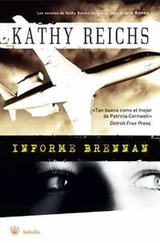“Did anyone follow up?”
“Wasn’t much to follow. Street people change addresses like the rest of us change socks. And most won’t give the cops squat. A prossie named Monique Santofer was also living with Forex at the time. Both were questioned, a few others. No one knew spit.”
Ryan and I said nothing. We both knew the reality.
After those queries, the file had probably circulated within the detective bureau, created no blip on anyone’s screen. From there, it had gone to a centralized missing persons division where far too few detectives were responsible for the impossibly large number of persons reported missing each year. Eventually, it had become buried in a stack of others like it.
But somehow, thankfully, it had found its way to Project KARE.
“Why do you think Forex made the effort?” I asked.
“Edmonton is a killing field for these women. Many are so scared they’re voluntarily giving DNA samples so their bodies can be identified if they’re killed.”
“The numbers are that high?”
“At least twenty women have been murdered since 1983. More are missing, maybe dead. And you know that asshole Pickton’s not far from anyone’s mind.”
Ollie was referring to Robert William “Willie” Pickton, a Port Coquitlam, British Columbia pig farmer convicted in 2007 of killing six women and charged in the deaths of twenty more. Many of Pickton’s victims were prostitutes and drug users from Vancouver’s downtown east side.
I didn’t work the case, but colleagues did. Excavation began when remains were discovered on Pickton’s property in 2002. The media went batshit, and a court-ordered ban on publication and broadcasting was imposed. Rumors ran wild. Bodies allegedly were left to decompose, fed to the pigs, ground up and mixed with pork from the farm.
Only when the trial began did details emerge. Hands and feet stuffed inside bisected skulls, remains dumped as trash or buried near the slaughterhouse, bloodstained women’s clothing in Pickton’s trailer.
Inexplicably, a jury found Pickton innocent of first-degree but guilty of second-degree murder in the deaths of six women. He was sentenced to life in prison, with no possibility of parole for twenty-five years—the maximum for second degree permitted under Canadian law.
At an estimated cost of $70 million, Pickton’s was the largest serial killer investigation in Canadian history. In 2010 the remaining twenty murder charges were dropped, ending any prospect of future trials. Prosecutors apparently concluded that since Pickton had already received the maximum possible sentence, further expense was not warranted.
A sad footnote. With the lifting of the media ban in 2010, the public learned that Pickton had been charged in 1997 for attempted murder in connection with the stabbing of yet another sex worker. The clothes and rubber boots he was wearing when arrested lay forgotten in an RCMP storage locker for seven years. When finally tested in 2004, they revealed DNA from two of Vancouver’s missing women.
Too late for a boatload of victims.
Ollie’s voice brought me back.
“—it’s not just Vancouver. Women have vanished or turned up dead along Yellowhead Highway 16 in BC. You know what they call that stretch now? The Highway of Tears. There are websites and magazines dedicated to it. And the RCMP has expanded the list of MPs and broadened the area they think that killer may be working. Who knows how many other victims are out there lying in ditches or shallow graves?” Ollie’s tone suggested both frustration and compassion.
“Thus Project KARE,” I said.
“I’ve been with the task force for two years. We’re committed to finding and caging these degenerates.”
“It’s an RCMP initiative, right?”
“Not anymore. In Alberta we’ve said enough is enough. In addition to members of the RCMP Major Crimes Units in Edmonton and Calgary, the task force now includes investigators from the Edmonton PD and other detachments having jurisdiction. These women need protection. The predators have to be stopped.”
Just as the death of babies disturbed Ryan, the slaughter of those on society’s fringe distressed Ollie. I remembered hearing the same passion in his voice years ago. It was one of the few things I’d liked about him.
“But it seems Ruben is not a victim,” I said.
“Tell me what you know.” Ollie pulled pen and notebook from his briefcase.
I listened as Ryan laid out the facts. The ER visit by Amy Roberts. The apartment in Saint-Hyacinthe occupied by Alma Rogers. Ralph Trees’s girlfriend, Alva Rodriguez. The babies. The fingerprint. The CPIC hit for Annaliese Ruben.
“And now Ruben is off the radar,” Ollie said.
“Yes,” Ryan said.
“You think she’s left the area?”
“Queries at the airport, bus and train stations, and rental car agencies came back negative. Ditto for taxis.”
“You pull the hospital security cameras?”
“She arrived and departed on foot. Approached from the direction of the apartment, which was under a mile away. Left heading the same way.”
“What about local stores, libraries, anywhere else they might have caught her?”
“Nothing.”
“Ruben have friends or relatives locally?”
“Other than Trees, the landlord, and one snoopy neighbor, no one seems to know she existed.”
“She wasn’t working the streets?”
“Not that anyone knows, but she had to have some means of support.”
“Meaning she has no arrest record in Quebec.”
“Zip. Maybe the learning curve in Alberta paid off.”
“You checked likely aliases?”
Ryan just looked at him.
“The Edmonton PD nailed Ruben twice for soliciting,” Ollie said. “She vanished right after the second pop.”
“In 2008,” I said.
“That skews right with the landlord’s time line,” Ryan said. “Paxton claims Ruben and a guy named Smith took occupancy about three years ago.”
“He retain contact information for Smith?”
“Not even a first name.”
“What could he tell you?”
“They were grand tenants. Didn’t complain about the plumbing. Paid cash in advance.”
“Where’s Smith now?”
“In the wind.”
“You try running him to ground?”
“Hadn’t thought of that.”
Ollie’s lower lids pinched up slightly at Ryan’s sarcasm. “Smith have a job? A car? A cell phone?”
“You want to run Smith, first name unknown, age unknown, physical description unavailable, be my guest.” Ryan flapped a hand at one of the computer terminals behind him.
There was a moment of tense silence. I broke it.
“You think Smith could be the high-rolling john Ruben intended to meet at the Days Inn? Maybe he talked her into heading east with him?”
“Nice of her to drop a line to the loving roommates back home.” Ryan shook his head in disgust.
“Did Forex ever get a look at this john?”
“No.”
“Where are Forex and Santofer now?” I asked Ollie.
“Santofer OD’d last year, so she’s out of the picture. Forex is still living at the same address. She owns the place.”
“You got surveillance on it?” Ryan asked.
“Hadn’t thought of that.” Ollie shot Ryan’s sarcasm right back at him.
“Any reason to suspect Ruben might have returned to Alberta?” I asked. “That may be her pattern. Leave town when things get hot. She knows people in Edmonton. It’s within her comfort zone.”
“Right.” Ryan snorted. “She motored west in her unlicensed Boxster. Or hired a limo and driver to take her cross-country.”
“She could have hitchhiked.” Terse. Ryan’s attitude was grating on me, too.
“If so, we’ll nail her. Every cop shop in Canada has her mug shot.”
Читать дальше









